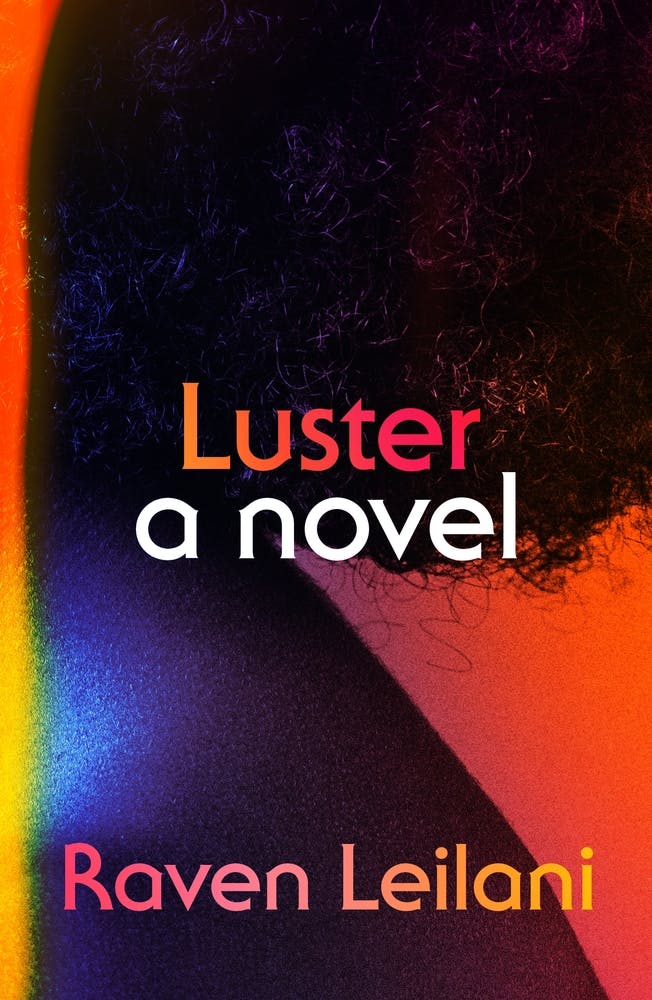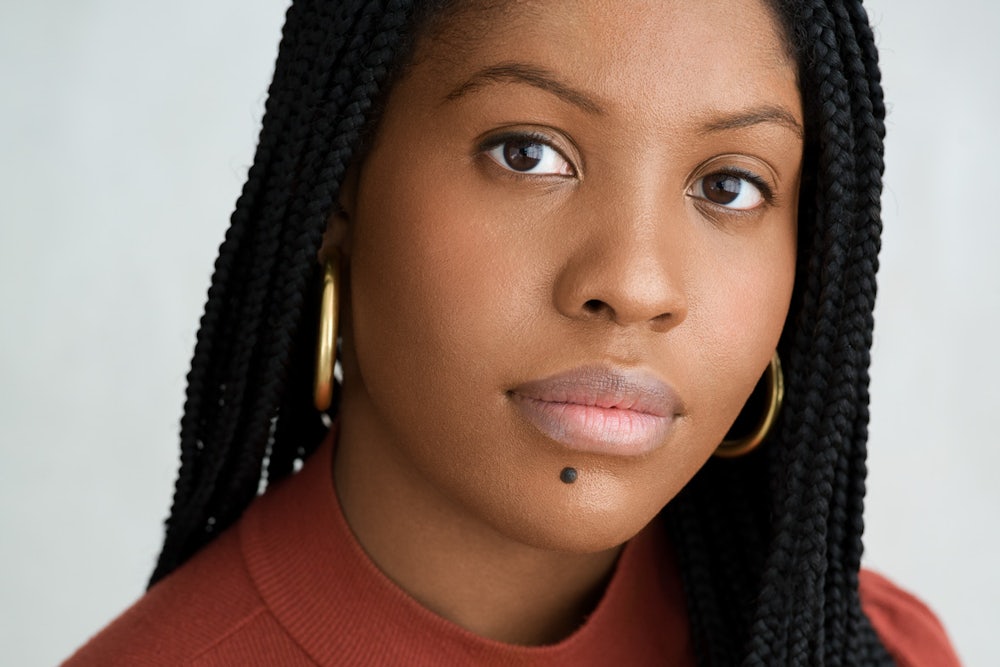Edie, the 23-year-old resident of a mouse-infested Bushwick walkup and the narrator of Raven Leilani’s debut novel Luster, has an editorial position at a children’s book publisher until she loses it by sleeping with one too many of her colleagues. Like Meursault, the protagonist in Camus’s The Stranger, she seems indifferent to other people’s disapproval. Her eye roves the world with an alienated intelligence, taking everybody’s measure, including her own. She acknowledges her own attractiveness (“Here’s a fact: I have great breasts, which have warped my spine”) and precarious social position (“More facts: My salary is very low”) like an arborist taking notes about a tree.

Luster’s plot kicks into high gear after Edie meets Eric, a married man living with his family in suburban New Jersey. She follows the tractor beam of physical desire into his life. She is bloodlessly accurate about their age difference: “Beyond the fact of older men having more stable finances and a different understanding of the clitoris,” Edie observes, “there is the potent drug of a keen power imbalance.” In contrast to her detailed inner monologue, Edie says little out loud. Edie is Black and Eric is white, for example, but they don’t talk about it. Edie likes it when Eric chokes or punches her during sex but doesn’t explain why. Edie reveals in an almost offhand way that she found her mother’s dead body six months ago but devotes pages of attention to the “inarticulable parts of being close to a man, the sweet, feral thing underneath their cologne, the way it sometimes feels as if there are no whites to their eyes.”
Then everything changes. After hitting financial rock bottom and running into Eric’s wife, Rebecca (they seem to have an ill-defined open marriage), Edie moves into Eric’s family home, where she discovers that they have an adopted Black daughter of 13 named Akila.
At first, Edie simply ignores Akila and continues to think about what interests her: the sex life of Rebecca and Eric. She’s ostensibly there as a sort of nanny-meets-mistress while she gets back on her feet, but really she’s more like an embedded anthropologist, studying the habits of life-partnered white heterosexuals in their New Jersey habitat. Her own mother was loving but unreliable and committed suicide not long before the book’s events take place. Rebecca is the exact opposite, mothering with competence but coldness—enrolling Akila in infinite extracurricular activities but neglecting to tend to her hair, for example. Edie is fascinated.
Luster appears at first like a peer to Sally Rooney’s Conversations With Friends, which also told in an evenhanded, almost clinical tone the story of an extra-marital affair from the perspective of the “mistress.” Leilani has a blistering talent for describing a moment while refusing to name its undercurrents. What begins as an erotic novel about Eric turns into the story of Edie’s fascination with Rebecca. She describes the wife in pointillist, physical terms: She is “sexy in the way a triangle can be sexy, the clean pivot from point A to B to C,” wearing her “depressing beige bra and high-waisted underwear with Wednesday on the back.” Rebecca is a medical examiner by trade, and Edie’s forensic inquiry into her private life mirrors the dissections Rebecca performs in the morgue.
But beneath all her analytical intelligence, Edie is a traumatized narrator. So when she meets Akila, a slightly miserable girl wearing a pink Party City wig who needs her adoptive parents to maintain a stable household more than Edie needs them for her own entertainment, it represents the intrusion of reality into the protagonist’s fantasy. Edie’s analyses of other people—these white New Jerseyans, her own dead parents, the people who work in publishing—are abstract, even dissociative. But Akila’s need is palpable. Amid all the delicious ambiguity of interfering in a marriage, Akila enters Edie’s life like one of God’s more obvious messages to tell her that there is sometimes such a thing as the right thing to do.
Several rave reviews have already focused on Leilani’s remarkable ability to turn straight sex into something terrifyingly strange yet familiar, almost as if Edie is reproducing an othering, fetishized gaze for what is considered normal. But Luster is also an interesting meditation on social ethics since the conundrum Akila poses to Edie is ultimately a moral one: Will she lend this kid a hand or not? In a recent piece on Sally Rooney for Bookforum, Lauren Oyler wrote that fiction today is overly concerned with being good. In novels by Rooney, Ben Lerner, Jenny Offill, and Sheila Heti, she writes, the young narrators’ anxieties “seem to be modeling contemporary ideas about morality, which is measured by contributions to the collective good.” Being perceived as good is the new version of divine judgment, Oyler goes on, since social media now requires that we perform our own goodness at all times online. The result has been a generation of creatives who are more censorious and judgmental than their forebears.
The latter point is a fairly widely held opinion among older professors and critics, many of whom think that fiction, morality, and social politics have been disastrously conflated to produce rigid and lifeless art. This view echoes others in the internet culture wars, which Oyler describes as a product of the “Great Awokening.” Think of the professors who argue that undergraduates who demand trigger warnings are waging war on ambiguity itself or the skeptical essays that bubbled up in the wake of #MeToo, claiming that feminists were on a witch hunt disguised as a justice mission.
Such criticisms underestimate the void that young novelists like Leilani now face when trying to tackle morality or ethics in fiction. Edie does not start with a moral code that she can use as a stick to beat her elders; quite the opposite, she starts with nothing and is bequeathed nothing. Her sexual conquests are also quests for knowledge and insight as she tries to reconstruct her understanding of the world following her mother’s death. Edie carefully picks her way through the fragmentary remains of the American nuclear family, a broken and jagged old ruin, to try to find what still matters.
Luster seems like the first crashing of a new wave of fiction defined by a world where all the traditional vocabularies for morality have gone defunct. That makes Luster an existentialist novel, like The Stranger, and a relative to literary modernism. But it isn’t, crucially, a nihilistic novel. Leilani is not interested in showing up, say, the hollowness at the core of law enforcement; in fact, she takes it for granted. Instead, by including the character of Akila, Leilani forces her protagonist to face up to the fact that being a person involves certain ethical obligations to other people, though she leaves Edie grasping for the words to describe them. The alternative isn’t the freewheeling relativism or “nuance” that an older generation so prizes but the absolutism of despair. It is small wonder that the best young minds in fiction are taking that dilemma as their subject.
